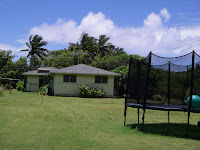
Recently, Miss Cheapist was fortunate enough to spend time on the island of Molokai, Hawaii. The experience could be summarized as unsettling solitude, unmitigated natural beauty, and a home-stay with a transplanted East Coast couple, whose lifestyle embodied a "back to the land"ethos not recognizable as belonging to the 21st century. Upon her return to New York, Miss Cheapist was forced to revisit the question: What was the city worth to her?
Unlike other islands in Hawaii, which have been developed into tropical play-lands, Molokai and its residents have fought to maintain a landscape and community preserved in time. Its main road runs less than 50 miles, from east to west, without a traffic light. It is dotted with homes of native Hawaiians, many of whom post hand-made signs protesting La'au Point, a concession made by a local group to allow a developer to build on one area for high-end eco-homes, in return for the protection of many more acres for generations to come. Four years ago, the hot-button topic was fighting the influence of "ice" on local youth and families.
With few hotels, paved roads, or shopping centers, one accustomed to the conveniences and luxuries of an island vacation might become frustrated. Not only could the island be much more pleasurable without blatant hostility toward outsiders and more access to recreation outside of expensive or extreme sports. The native-led moratorium on development also seemedl to undermine the chance of improvement in the island residents' quality of life, and many do struggle with the worst poverty in the state. La'au Point was not exactly an eminent domain story of a Bruce Ratner displacing whole communities to build a stadium, a borough given over increased congestion, noise and obnoxious land-grabbing. These proposed homes will barely leave a carbon footprint on the island, and the money from sales will allow the developer to reopen an old hotel, creating more jobs. The amount of protected land offered in exchange is far larger than any won by a grass-roots movement, and would remain untouched into the future. The resistance from Hawaiian groups highlighted how fiercely a betrayed community will fight to hang on to their last remaining assets, expecting reparations for past injustices. Undeniably native Hawaiians have been subjected to a near-genocide in the process of American colonization of the islands. However, could this conflict stall the growth of today's generation of Hawaiians, perpetuating distrust and knee-jerk reactiveness to any change? Uncertain if she was even entitled to an opinion on these local politics, Miss Cheapist felt her class conscience challenged.

The setting allowed her to spend significant time before a vast and unforgiving sea, reflecting upon her existence. Without the distractions and desires of urban life, she quickly became frightened. Once dwarfed by the high prices and lack of authenticity in the city, she then found herself scared of the dark and unable to grapple with her helplessness in the face of unimaginable natural forces.
The city, she realized, allowed her (and many others, she supposed), to delay a necessary process of self-actualization. With nightlife, shopping, and other opportunities to pursue pleasure and companionship, she never really needed to test her own physical strength and mental acuity. Urbanites tend to believe that because they work hard, play hard, and can withstand the threat of "crime," that they have truly challenged themselves. Yet, in nature, another set of skills were required. In New York, Miss Cheapist could always blame something other than herself; there was always someone richer, more savvy, more fit, and more educated than oneself in the city. Survival meant merely accepting this truth and coping with grace.

After Miss Cheapist came to this revelation, she began to observe the lives of her friends who moved there, the M. family. They were not intimidated by Molokai's remoteness, excited by the opportunity to create a garden, spear-fish with sharks for food, educate their child among people of a different race and culture, and actually integrate themselves into a community. They raised corn and squash. Their newly acquired chickens roamed freely on the property and ate homemade grain. After four years of attending an immersion school, their son was fluent in Hawaiian and considered the island his home.
At the same time, they worked crazy hours at their not-for-profit jobs, fought like any other married couple, and worried about paying their mortgage. Not completely disdainful of the trappings of modern life, Mr. M, had formed an unnatural attachment to his newly acquired iPhone. After a hard days work, he clutched it like a drink, taking in segments of Fox reality shows purchased online. It was clear some things would always be inescapable, regardless of one environment. Perhaps they also paid a price for their isolation.

Ms. M joked to Miss Cheapist that if the end of the world ever came, she could always flee to their home, which was created as its own self-sustaining entity. Mr. M. joked that Miss Cheapist would not survive one day in Molokai, silently condemning her existence to one of a spoiled, city girl dependent on a Candace Bushnell fantasy.
He was probably right, on some level, as the visit was more unsettling than relaxing to her by the end. Upon her return, the city no longer seemed to represent the center of the universe. Miss Cheapist knew there was more out there, and her ambitions leaned in a new direction.
But did she have the courage to pursue it?


No comments:
Post a Comment